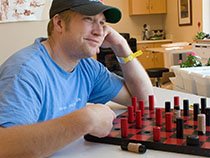
I've recently been chided for not updating the blog, and I apologize.
First of all, a clarification of the last, cryptic post. We found out at the cognitive testing that Todd is very close to being ready to begin re-entry into the work force. Now, before you go getting a giddy and excited, understand that this doesn't mean that he's "cured" or completely recovered. And it by no means indicates that he's ready to hit the work force running.
Rather, it means that he's entering the next phase of therapy, with employment being a tool. He is to start very small, with basic employment skills like showing up on time, accountability for tasks, interacting with managers/coworkers, and the like. He will continue to work with his OT as he encounters stumbling blocks, and continue to move through more and more challenging occupations. You see how this is going to be a very tenuous, difficult, and frightening (for both of us) stage. How to obtain basic employment? How much to disclose? How to plan and train for and move ultimately to an entirely new career? How to pay our bills while we work toward that?
The reason I was so cryptic about it before was that I didn't want to risk posting something on here, and it some how getting back to his disability insurance that he was ready to go back to work, and have him get kicked off his disability policy, and us wind up with no income whatsoever, and no way to pay our bills, with Todd still not able to go back to work, and me still needing to do and be everything at home. (Though, don't get me wrong, Todd is very helpful, and does quite a bit at home, and is a huge help.)
We've learned that his policy includes a return to work plan, such that he can work, and as long as he works part time, and makes less than 20% of his former salary, it will not affect his disability pay out. As he starts to earn and work more, it's based on percentages, until he reaches 80% of his former salary. That's the basic gist of it, to my understanding.
Todd is now driving, and has no restrictions, which has been an enormous relief. Taking himself to therapy has enabled us to get Oliver back on a semi-normal schedule, so he's happier too. And it's nice to be back in the passenger seat. And this is a big step one to returning to work.
Todd went to an orientation for Vocational Rehab, and was left in doubt of how much they would be able to help. He was in with cancer patients, amputees, and parolees. From what we understand, Voc Rehab people tend to have a hard time helping people with brain injuries like Todd's. They do great with people who have obvious physical impairments to working, but when it comes to the finer cognitive deficits, they kind of don't know what to do. He's still planning on meeting with the counselor, so we'll see.
The biggest things he's still struggling with are fatigue and clarity (or lack thereof.) He still sleeps about 12 hrs a night, and is still tired all day long. More so if you add anything extra on top. Like appointments. Family get togethers. A rough day with Oliver. Staying up too late. Illness. You can see how that will be a big impediment to working.
He feels like he's trying to think through a fog, like everything takes longer, is harder, and more taxing. He mentioned that he has brief moments of clarity though, which is very encouraging. The Dr. pointed out that with his speech, he started off not being able to say anything. Then he could get a few words out, but they didn't make any sense. Then he gradually started making a little sense, but most of the time it was still nonsense. As he progressed the balance shifted, and most of the time he made sense, but still had many times when he didn't, and it was made worse but fatigue and exhaustion. Now he pretty much makes sense all the time, but there are times when he gets what he's trying to say just the tiniest bit confused. The Dr. anticipates that his thinking will do likewise, and become more and more clear as time goes on. He may still have some lingering foggy patches (our experience talking to other brain injury survivors indicates this is so) but in general he will probably get to where those are relatively few and far between. There are no guesses as to how long this will take, however, and it's this nuance of thought that makes him unable to work.
Take a moment to sit back and close your eyes, and imagine staying up all night, then taking some NyQuil or Dramamine, or getting drunk, perhaps, and if you're female, add in some PMS or pregnancy emotionalness, and feeling like that each and every day, with no respite, and you'll have a notion of what Todd deals with every day.
And then imagine trying to work.




